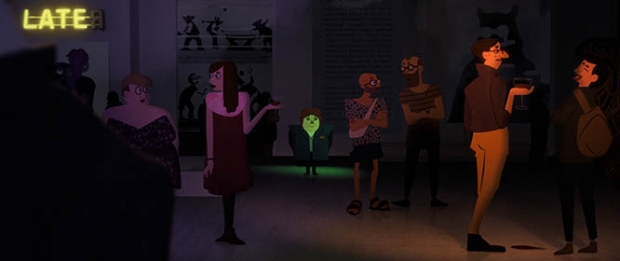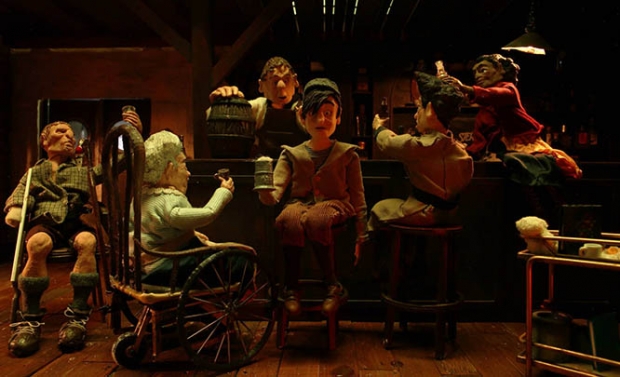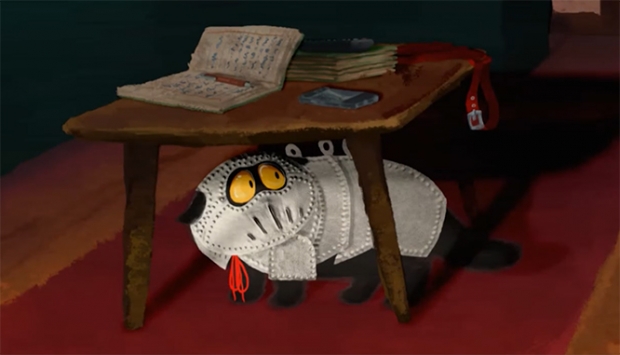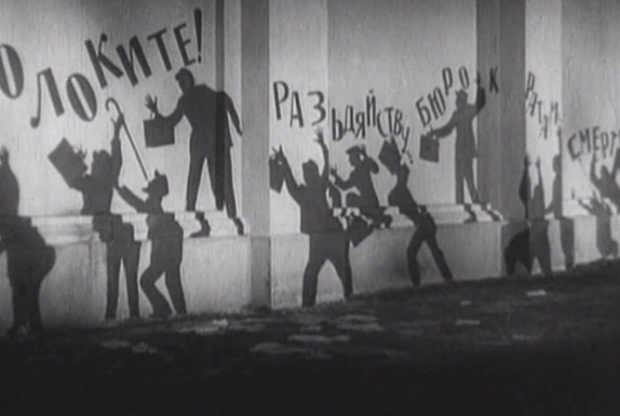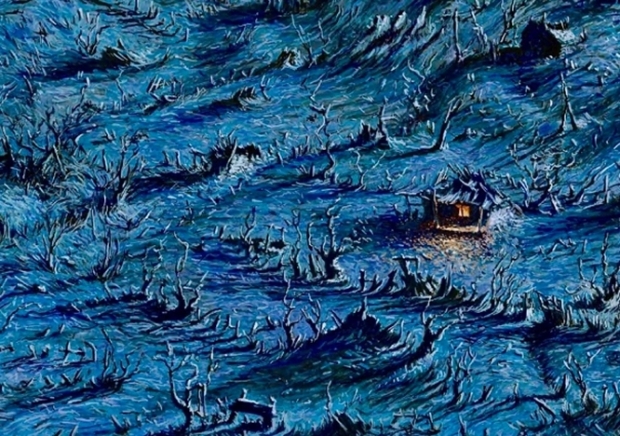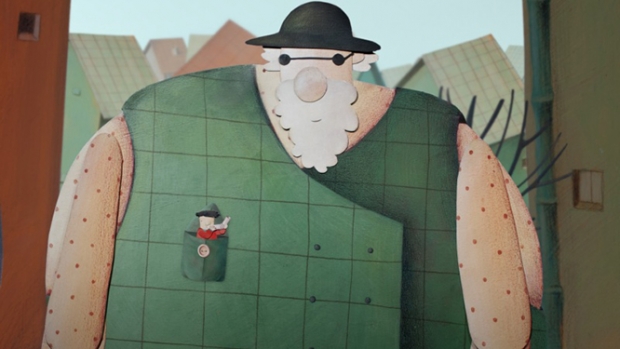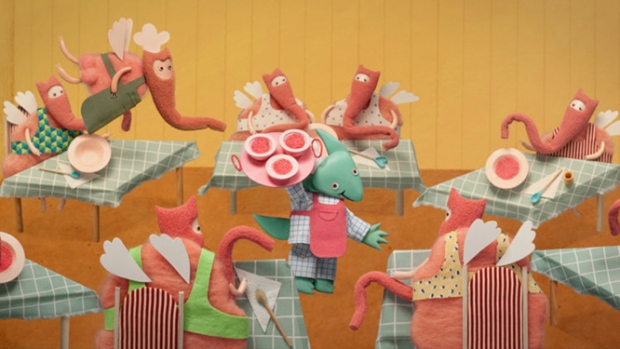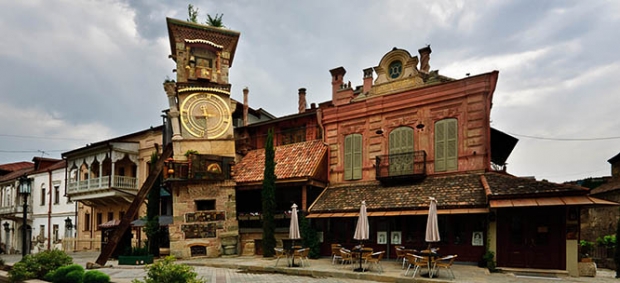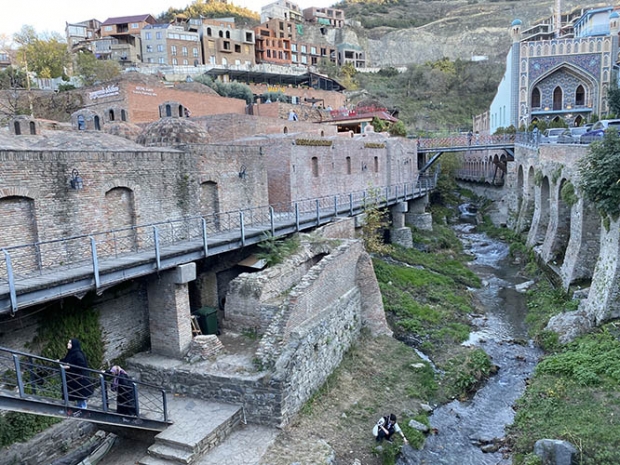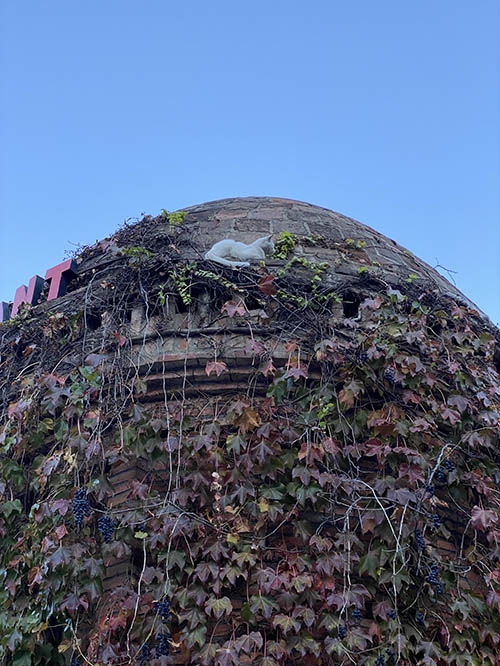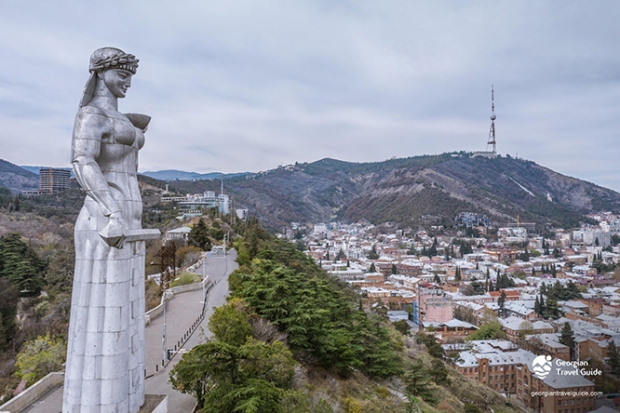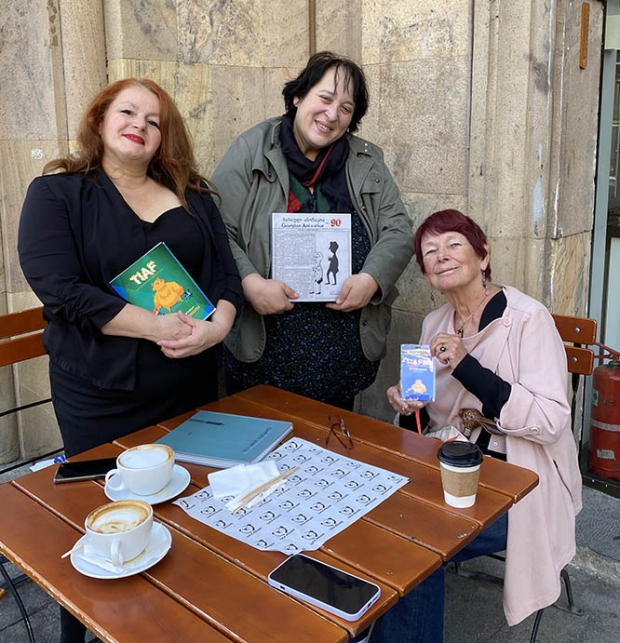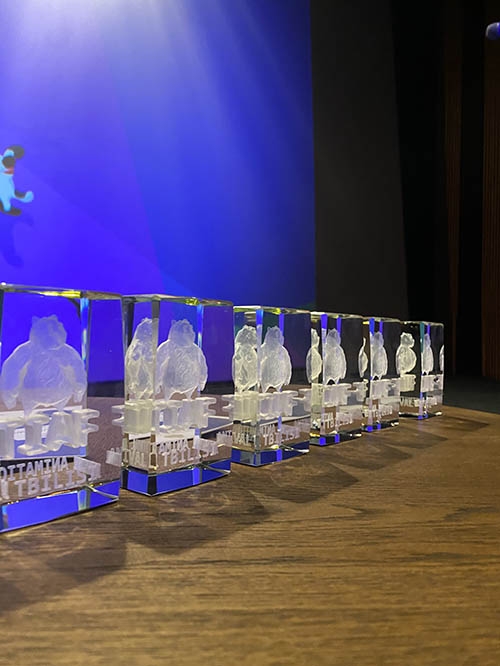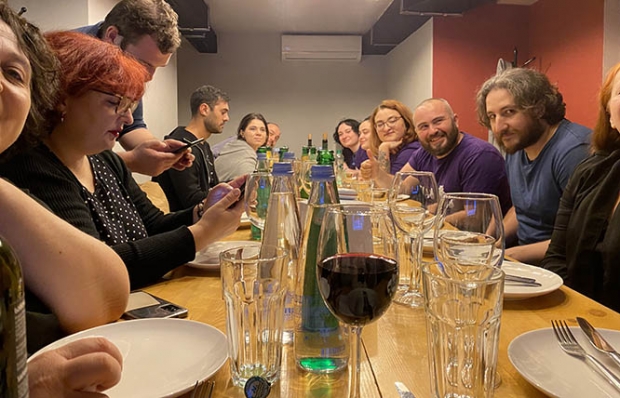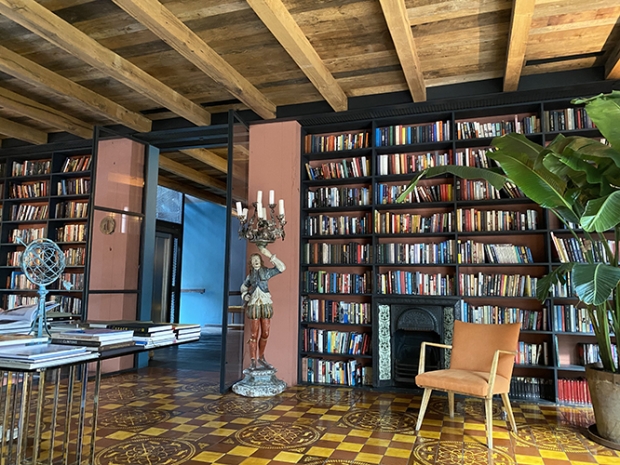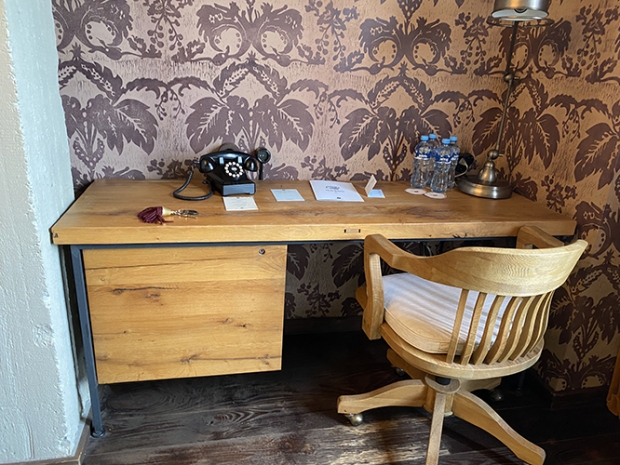I was invited to be head of the jury at the Tbilisi International Animation Festival
When I was invited to be head of the jury at the Tbilisi International Animation Festival, I was very excited. I had been to The Republic of Georgia once before for the excellent Tofuzi Animation Festival in Batumi which is on the other side of the country from Tbilisi on the Black Sea.
I had already seen several of the films in the Short Film Competition. I have watched Dies Irae several times and I always enjoy it. The tagline is “Two playful angels, seven sinful pigs, and one poor righteous soul”. The action, and there is plenty of it, takes place in and around a four-story three-flat building, happening in a butcher shop, on the roof of the building, and in the street. The 8-minute film is morbid and hilariously funny if you like black humor. With the action going on through the building and street, there is a lot to watch; so the film needs more than one or two viewings to take it all in. The title of the film, Dies Irae, literally means “day of wrath” and describes Judgement Day. Derived from a Medieval Latin poem, it is also one of the most famous melodies of the Gregorian Chant. Composers from Mozart to Verdi have set the words to music.
The director of the film is listed as the Maru Collective Group from Australia. I tried to find out more about them, but all I could come up with is that they are a collective of people from various countries who love to make animation. If anyone out there knows anything about them, please let me know because I am curious about exactly who they are and what other films they have made.
Directors Dotan Goldwasser and Yoav Brill from Israel made a 14-minute film, Temporarily Removed, which is about loneliness, modern art, and air conditioning. A middle-aged female security guard feels that she is the queen of her exhibition room in the museum. When she is forced to leave her post due to a malfunctioning air conditioner, her world is suddenly turned upside down. The film mixes humor and pathos while taking us behind the scenes of what goes on in a museum.
Our jury unanimously gave the Grand Prix to The Last Bar. The film, director Arne Hain’s diploma project at Filmakademie Baden-Wuerttemberg, is the story of Melvin who is kicked out of the family home on his 21st birthday when his father accuses him of laziness. Troubled by obsessive thoughts and inner demons, Melvin finds himself on the edge of a cliff, far up North at the edge of civilization.
The last thing that he expects to find there is a bar, the Last Bar, run by an old lady in a wheelchair who insists that Melvin come in. Once inside, he gets acquainted with the quirky characters in the bar and he finally comes face to face with death, where he takes responsibility for the first time in his life. In the end, he realizes that he has found a warm place for himself amid all of the darkness that surrounds him in the last bar.
The director says that the 13-minute 21-second stop-motion film is a pilot for a series, but the film can stand alone perfectly well. The story is compelling and you care about the characters in the film. The construction and movement of the puppets is flawless. The Last Bar won Gold at the Young Directors Award in 2023 at Cannes. I look forward to the next adventure with Melvin and the rest of the characters.
In her film in the Georgian National Competition, Oh! Mother, Mother, Khatuna Tatuashvili poses the question “Can you love your cat too much?”. Mother takes overprotective parenting of her beloved cat way over the top when she builds a suite of armor for him. The one-minute film is very cute and anyone who loves their cat will recognize a little bit of themselves in it. I enjoyed meeting Khatuna in Tbilisi; she gave me a lovely drawing of the cat in his suit of armor which is now framed and on my wall.
Georgia has a rich animation history dating back to 1929 when Kote Mikaberidze created My Grandmother (Chemi Bebia). In the 1990s an economic and political crisis began in Georgia that harmed the entire film industry, including animation. Studios were destroyed and over the next ten years, only twenty-five short films were made in the entire country. By 2000 the situation had stabilized and Georgia was once again producing award-winning films.
In 2017 Dato Kiknavelidze created Georgia’s first 3D animated film, Geno. Inspired by the ever-growing problem of the loss of wildlife habitat, the film is set around a lake and its animal and insect inhabitants who are faced with losing their natural habitat due to the construction of new houses. Geno was screened at numerous festivals including Annecy and the Trickfilm Festival in Stuttgart.
Mariam Kapanadze was awarded both the Jury Award and the Audience Award in 2021 at the Paris International Animation Film Festival for her film Abandoned Village. The title of the film is a metaphor for a person who has forgotten the feeling that comes from approaching the world with love. Mariam also received The Japanese Foreign Affairs Ministry Award for Abandoned Village.
Illustrator and animator Ana Chubinidze’s 2016 debut film The Pocket Man is about a tiny man who lives in a suitcase. One day an elderly blind man accidentally crashes into the suitcase and it pops open. The two men become friends and the little man soon finds a home in the blind man’s pocket where he becomes the blind man’s eyes and guide. The film, produced by Folimage, was the first joint Georgian/French animated project. It has won several awards.
Ana’s second film, Franzy’s Soup Kitchen (2021) is based on a book that she wrote and illustrated about the lonely alien chief Franzy who discovers that her special pink soup is not only delicious but is also magical. When she shares it with starving creatures living on a strange planet Franzy isn’t lonely any longer. The 8-minute 30-second film was a co-production between Folimage and Pocket Studio in Georgia. The film won 24 awards and was selected for 137 festivals.
During TIAF, Ana gave a workshop on stop motion using Franzy’s Soup Kitchen as a case study. Khatuna Tatuashvili also used her Oh! Mother, Mother to demonstrate how a film goes from idea to the audience. A masterclass given by Elene Tavadze and Sofo Tchintcharauli discussed innovations in Georgian puppet animation.
One of the great pleasures of my visit to the festival was getting to know Tamu Abramidze, my translator and guide. From the moment she picked me up at the airport in the middle of the night I immediately liked her. Her sense of humor coupled with good common sense and a keen knowledge of her city let me see and learn things that I would never have known on my own.
Tbilisi is one of the oldest cities in the world. It existed as the capital of the kingdom of Iberia, and its Old Town was declared a UNESCO World Heritage Site in 2007. One afternoon Tamu took me on a tour of the fascinating old part of the city.
Tbilisi's old town is built on a hillside on the Western side of the Mtkvari River which runs through the city. Walking through the winding streets with its mixture of architectural styles you get a true feeling of history.
I was enchanted by the clock tower outside of the puppet theatre, which is truly a fairy tale creation. It was built by Georgian theatre and film director Reza Levanovich Gabriadze, who the theatre is named after. There is an angel that comes out and strikes the bell with a small hammer on the hour and a small mechanical puppet theatre inside the tower that twice a day at noon and 15h00 puts on a show called The Circle of Life. Constructed in 2010, the tower is decorated with hundreds of tiles designed by Gabriadze. Unfortunately, I didn’t get to see the clock in action but it is quite a magnificent structure just to see.
Tbilisi has numerous sulfur baths. The name of the city means warm place and it is built on top of thermal springs. The water contains so much sulfur that you can smell it as you walk along the river bank. The water temperature is between 40° to 50° C. I was told that the interiors of the baths range from ultra-luxurious and expensive to basic, but whatever your budget is, in the end, it is the same sulfur water in all of them. You can also opt for a massage and scrub down along with your soak.
Narikala Fortress overlooks the Mtkvari River. Consisting of two walled sections between the sulfur baths and the Tbilisi Botanical Gardens, the walls date from various periods, the earliest being from the 4th century when it was a Persian citadel. Most of the present walls were built in the 8th century by the Arab emirs, whose palaces were inside the fortress. Georgians refer to her as Mother Fortress.
There is a 20-meter-high statue of Mother Georgia or Karlis Deda, built in 1958 to commemorate Tbilisi’s 1500th anniversary. She is the symbol of the Georgian national character: a woman in traditional Georgian dress holding a bowl of wine in her left hand to welcome those who come in friendship and her right hand holds a sword for those who come as enemies. Standing near the fortress she can be seen from the entire city.
After the tour of the old town, Tamu took me up into the mountains to Mtatsminda Park on top of a mountain. The views were fantastic. We were so high up that the city looked like a miniature diorama. The park is a lovely place to stroll around. There is a restaurant, a Ferris wheel on the edge of the mountain, carousels, a roller coaster, a playground for smaller children and much more. There is also a lovely little outdoor café where you can also get a hologram of yourself made. It was a lovely place for a stroll amid the beautiful trees.
I had dinner with the festival staff at the Taglura Restaurant in the foothills on the road to Mtatsminda Park. The restaurant serves delicious traditional food family style. They make the most delicious, juicy dumplings that I have ever eaten and their wine was excellent. It was lovely to spend some relaxed time with everyone.
We were joined at dinner by my fellow juror Ketevan Janelidze. She is a producer, film historian, and researcher of Georgian cinematography. I enjoyed talking about film with her and on the closing night, she gave me a lovely present, a Georgian table runner with a traditional design on it. It is just lovely.
My big culinary discovery in Tbilisi was Lobio, a bean stew. Lobio in Georgian translates to beans. Ground walnuts are used as a thickening agent and added to the mashed beans. Special spices are also needed to get just the right flavors. Dato Kiknavelidze gave me a lovely present, a bag full of packages of all the spices that I need to make Lobio at home.
On my last evening in Tbilisi after the awards ceremony, I was taken to a true feast at a restaurant in town. The long table in our private room was full of festival staff and Georgian animators. The food started coming, and coming, and coming. Dato kept ordering more dumplings, more of them than even I could eat which I didn’t think was possible. Also, there were many toasts of delicious Georgian wine. It was an evening full of laughter that I will never forget.
I don’t usually write about hotel rooms that I stay in but the Rooms Hotel in Tbilisi is truly unique. The first thing that you notice when you enter the hotel is a room with every wall covered in floor-to-ceiling bookcases filled with books. There are also chairs and couches to relax in when you find a book that you want to read. Just my sort of room. The building was a publishing house during the Soviet era and even though its amenities are completely up to date, everything possible has been done to preserve the history of the original building. There are extremely high ceilings and warehouse-style windows, reclaimed wood, and I was told that all of the wallpaper in the rooms and public areas was handmade.
My room, which was quite large, had a dark wood floor, an old-fashioned desk with a swivel chair with a rotary dial telephone that worked. I also had an easy chair with an ottoman. The breakfasts were astonishing with buffet islands holding everything imaginable from fresh fruits and pastries to pate and hummus. There were three chefs to fix anything that you might want and waiters who came to your table to see if you wanted the chefs to fix you anything special. There was a common room with an excellent stereo system and a good collection of records that were welcome to play. I found out that during the warmer months of the year, old black-and-white movie clips are shown on a brick wall in the garden bar area. If I were ever going to spend the rest of my life in a hotel The Rooms Hotel would be it.
All too soon and far too early, before sunrise, Tamu and Dato arrived to drive me to the airport. Tamu gave me two lovely books, one of Georgian poetry and the other book, The Knight in the Panther’s Skin, written by Shota Rustaveli. It is a Georgian medieval epic poem that was written in the 12th or 13th century, Rustaveli is Georgia’s national poet. The poem consists of over 1,600 Rustavelian Quatrains and is considered to be a masterpiece of Georgian literature. Tamu told me that it is one of her favorite books and I certainly enjoyed reading it.
There is no way that I can thank Tamu for all of her kindness and most of all for her company. We have forged a bond and have stayed in touch. Dato was also wonderful company. He was so busy keeping everything running smoothly at both festival theatres which were a block apart and he was never too busy to flash a smile while he was on the run. A very big thank you goes to festival director Lali Kiknavelidze for inviting me to be on the jury and giving me such wonderful hospitality. I will never forget my time in Tbilisi.

